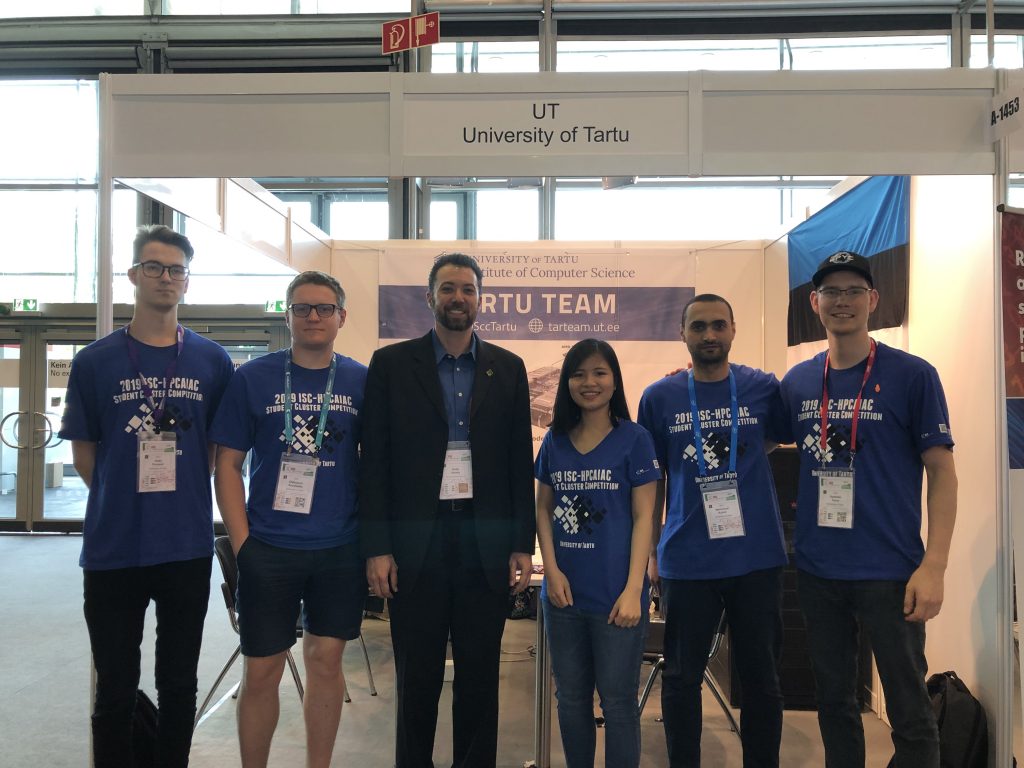-
Published: August 30, 2021

About the competition
The competition requires the team to build a cluster with a 3000 W power limit to solve various highperformance computing tasks, including deep learning for climate analytics task, quantum chemistry simulations, cosmological simulations and high-performance computing benchmarks. Moreover, they need to tune the code compatible with their cluster and optimise its performance. Another challenging task is controlling the energy efficiency and power consumption of their cluster.
Who Are We?
The Tartu team was established at the end of August 2018. Our goal is to participate successfully in the 3 biggest Student cluster competitions in the world: – ASC19 Student Supercomputer Challenge in Dalian, China; Apr. 21-25 2019.(https://www.ascevents.org/ASC19/index.php). The team competed with more than 300 teams from the world and qualified for the final round of the competition. – ISC 2019 Student Cluster Competition in Frankfurt, Germany; Jun. 17-19 2019. (https://hpcadvisorycouncil.com/events/2019/isc19-student-cluster-competition/). The team was selected to participate in the competition and compete successfully. – SC 2019 Student Cluster Competition in Denver, US; Nov 17-20 2019. (http://studentclustercompetition.us) Qualified to participate with a highly evaluated proposal.
The Tartu Team consists of 6 highly motivated students with diverse backgrounds in different areas who would love to contribute to HPC field. The student cluster competitions give excellent opportunities to get noticed in the field early our careers. We believe that our diversity in skills and determination is the key to effectively solving problems that require out of the box thinking. For more information on our team and members, please visit our website: https://www.tarteam.ut.ee
What We Do?
A typical cluster competition involves compiling and running an application. The final score is usually determined by runtime and/or accuracy, so optimising the performance will definitely be beneficial. Usually the optimisation part can be done by choice of libraries, compilers, and compiler options or even modifying the source code if there is a possibility for that. In addition to that, the applications should be compiled to run on multiple nodes and if possible (and beneficial) utilise GPUs. Currently, all members are trained so that they can work competently on the cluster. System administration and programming are basic skills all members should have. Students are also supposed to understand what the applications do in term of mathematics. Besides, we are encouraged all members to use performance analysis tools to profile the source code. Together with the advices from scientists in our university, the students can actively learn about the HPC and can compete successfully in the competitions. Moreover, it is a great stepping-stone for their career in the future. The team also learned to set up cluster from the zero. The global file system and monitoring system should be implemented, maintained and optimized.
What We Had?
Our sponsors NVIDIA, AMD, Mellanox, Gigabyte, Toshiba and Network Tomorrow have provided us with their latest technology. Joining our team would provide you with access to our cluster for working on the competition tasks. The current cluster consists of 6 nodes including:
- 10 x AMD EPYC 7601 @2.7GHz (320 cores in total).
- 8x NVIDIA Tesla V100 32GB VRAM.
- 1024GB RAM.
- 3TB SSD
- EDR Infiniband Connect5X Futhermore, AMD confirmed to provide us with their newest processors – EPYC 7742. We are working to get the new cluster ready in the middle of September.
More information:
The news about our team at the ISC19:
- university tartu students participate international cluster buildingcompetition
- gigabyte powering the next generation of hpc talent at isc
The list of application